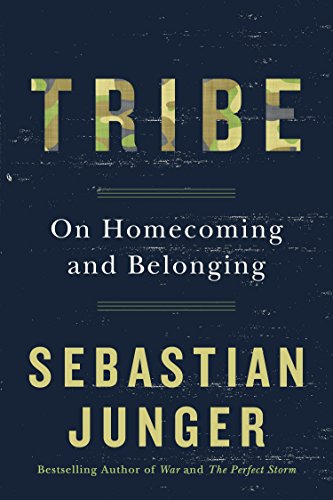On Homecoming and Belonging
by Sebastian Junger
Reviewed by Brian R. Wright
 Tribe, working definition: The people you would share the last of your food with.
Tribe, working definition: The people you would share the last of your food with.
A short read, yet a powerful one. Junger is an established writer-journalist—The Perfect Storm (1997), A Death in Belmont (2007), Restrepo, film (2010), War (2010)—who takes on the social psychology of individuals wanting to feel part of a larger special community of souls. [I would use the word, collective, except for its often-negative connotations. What distinguishes a ‘good’ collective or community is the individual’s choice in the matter. And what initially drew me in to Mr. Junger’s narrative was his recounting of how during American colonial days, large numbers of the whites would wander off to live with the Indians… so much so that the Puritans had laws against it.(!) [There were no recorded cases of the reverse, where Indians chose white society.]
“’We had no master to oversee or drive us, so that we could work as leisurely as we pleased,'” she explained. ‘No people can live more happy than the Indians did in times of peace…. Their lives were a continual round of pleasures.'”
— p. 11 Seneca captive, Mary Jenison.
Reminds me of things spirit brother, Russell Means, would say.
The author’s interest in the subject stems from some early observations while he was still living in suburban Boston: simply that modern conventional American life affords very little in the deep and self-sustaining spirit of community. So he set out on a wander to the West, 1986, hitchhiking, had an incident with a disheveled man who stopped to give Junger the man’s whole ration of food, made a special effort to see how Junger was doing. [To my mind, this was an instance of general humanity, perhaps encouraged by the man’s social group, but certainly something the man might have done completely on his own.]
This caveat of mine points to the general criticism I have of Tribe, namely that the Howard Roarks of the world, in their own souls, can and do act generously and, if you will, even ‘selflessly’ for others. For their own chosen community—friends, family, loves, churches of what’s happnin’ now (ref. the Robert Duvall movie, Apostle). In other words, the true and natural spirit of ‘tribe’ is an expression of a natural individualism to be extolled… not a blurry, mind-subordinating collectivism, which is all the rage in these days: human consciousnesses becoming part of a process rather than apprehending concepts.
Homecoming and belonging are a sharing of unique and empowered individuals.
To be fair, the author does not fall into the trap of maudlin statist-collectivism, not explicitly, anyway. Not on the level of real personal human interaction: “We have a strong instinct to belong to small groups defined by clear purpose and understanding—’tribes.’ This tribal connection has been largely lost in modern society, but regaining it may be the key to our psychological survival.” Agreed, let’s get going on that, esp. w/Tribe= humanity as a whole.
Unfortunately, Junger’s insights when the subjects are soldiers prosecuting modern globalist wars (mainly illegitimate American and Israeli aggressions) have a tinny quality because of that. Yes, readers will appreciate the stress of war and that ‘band of brothers’ all-for-one-one-for-all feeling during extreme circumstances. [Good example, Eastwood’s movie American Sniper.] At the same time, such wars are ultimately artificial creations and manipulations of humanity by various elite groups of Men of the Power Sickness: the best thing to be said for tragic pawns of these wars is not to be one.
If you take out the war settings from Tribe—which I’m afraid only helps to perpetuate the Orwellian brainwashing, the constant-war-for-constant-peace justification—then I’m all in. I think Junger has, indeed, helped flesh out basic human needs, per the Self-Determination theory. Individuals are fulfilled as they:
- feel competent at what they do.
- feel authentic in their lives.
- feel connected to others.
Plus, Junger does a fine job of demolishing corporate greed-qua-corruption, of which so many notable examples exist we reach outrage fatigue. Junger quietly dissects several of the more egregious instances, showing how these apparent pursuits of individual pleasure are anything but. Here, I’m reminded of the distinction in Ayn Rand’s The Fountainhead, again, between Gail Wynand, the man who sacrifices others to himself with abandon, and Howard Roark, the noble soul who neither sacrifices others to himself or himself to others.
Finally, Junger is an excellent writer: his prose clean and direct. Nice culmination, speaking of the Noble Soul, with his story of the Cree Indian who gave food. It’s all about being alive on the inside.
This post has been read 1074 times!

